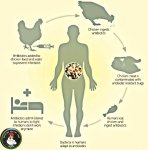Keystone Poultry Farm
Author
The reason why at Keystone we encourage use of Phytobiotics instead of antibiotics..
Antibiotics in poultry make humans resistant to drugs that fight infections.
Phytobiotics can be defined as plant derived products added to feed in order to improve performance. They originate from leaves, roots, tubers or fruits of herbs, spices and other plants. They may be available in solid, dried, and ground forms, or as extracts (essential oils). In simple terms, phytobiotics are products of plant origin, and preparations such as thyme, oregano, turmeric and garlic are gaining interest among researchers and poultry producers.
*Garlic
*Turmeric
*Oregano
*Moringa
*Thyme
*Aloe-Vera
*lemon
Birds bred in crowded pens have to be fed antibiotics so they don’t get infections and grow faster.
Growth boosters are currently flooding the market..this chemicals are dangerous to the end consumer.
More than Half of broiler chicken meat and eggs are estimated to have antibiotic residue. This means people who consume them slowly develop a resistance to antibiotics, and will not respond to treatment of bacterial infections. This is why some doctors advice against eating broiler chicken meat, and most big hotels now choose to go for improved kienyeji chicken meat for their clients.
An epidemic of anti-microbial resistance is sweeping the world, and scientists say one of the main reasons is the ingestion of antibiotics from poultry products, dairy milk, pork and aquaculture fish.
Common illnesses are turning into potential killers, and surgery can sometimes be fatal because of ‘superbugs’ that are immune to most antibiotics. Patients are also not responding to antibiotic treatment for typhoid, tuberculosis, pneumonia, or common infected wounds.
There is a need to make poultry farmers aware of the dangers. Many have a misconception that antibiotics prevent infections and promote growth, when it should be given only for treatment. However, some farmers say it is impossible to run a modern poultry business without antibiotics because of the widespread danger of avian infections.
The link between anti-microbial resistance in humans and antibiotic use in poultry and livestock is now scientifically proven, and countries around the world have banned their use as growth promoters. Many countries still allow limited use to control poultry epidemics, but enforce a window period after the drugs are administered so the meat does not have drug residue when consumed.
Sweden was the first country to stop animal antibiotic use as growth promoters, in 1986. In 2006, the EU banned all antibiotics used to make animals grow faster. In 2017, the US also restricted antibiotics as feed supplement.
In the Asia Pacific region, antibiotic use in poultry feed is projected to rise by 129%, by 2030, with India and China leading the way because of higher living standards. Bangladesh law in 2010 criminalises antibiotic use as growth promoter in animal feed.
Be informed.
#keystonepoultryfarm
Antibiotics in poultry make humans resistant to drugs that fight infections.
Phytobiotics can be defined as plant derived products added to feed in order to improve performance. They originate from leaves, roots, tubers or fruits of herbs, spices and other plants. They may be available in solid, dried, and ground forms, or as extracts (essential oils). In simple terms, phytobiotics are products of plant origin, and preparations such as thyme, oregano, turmeric and garlic are gaining interest among researchers and poultry producers.
*Garlic
*Turmeric
*Oregano
*Moringa
*Thyme
*Aloe-Vera
*lemon
Birds bred in crowded pens have to be fed antibiotics so they don’t get infections and grow faster.
Growth boosters are currently flooding the market..this chemicals are dangerous to the end consumer.
More than Half of broiler chicken meat and eggs are estimated to have antibiotic residue. This means people who consume them slowly develop a resistance to antibiotics, and will not respond to treatment of bacterial infections. This is why some doctors advice against eating broiler chicken meat, and most big hotels now choose to go for improved kienyeji chicken meat for their clients.
An epidemic of anti-microbial resistance is sweeping the world, and scientists say one of the main reasons is the ingestion of antibiotics from poultry products, dairy milk, pork and aquaculture fish.
Common illnesses are turning into potential killers, and surgery can sometimes be fatal because of ‘superbugs’ that are immune to most antibiotics. Patients are also not responding to antibiotic treatment for typhoid, tuberculosis, pneumonia, or common infected wounds.
There is a need to make poultry farmers aware of the dangers. Many have a misconception that antibiotics prevent infections and promote growth, when it should be given only for treatment. However, some farmers say it is impossible to run a modern poultry business without antibiotics because of the widespread danger of avian infections.
The link between anti-microbial resistance in humans and antibiotic use in poultry and livestock is now scientifically proven, and countries around the world have banned their use as growth promoters. Many countries still allow limited use to control poultry epidemics, but enforce a window period after the drugs are administered so the meat does not have drug residue when consumed.
Sweden was the first country to stop animal antibiotic use as growth promoters, in 1986. In 2006, the EU banned all antibiotics used to make animals grow faster. In 2017, the US also restricted antibiotics as feed supplement.
In the Asia Pacific region, antibiotic use in poultry feed is projected to rise by 129%, by 2030, with India and China leading the way because of higher living standards. Bangladesh law in 2010 criminalises antibiotic use as growth promoter in animal feed.
Be informed.
#keystonepoultryfarm

